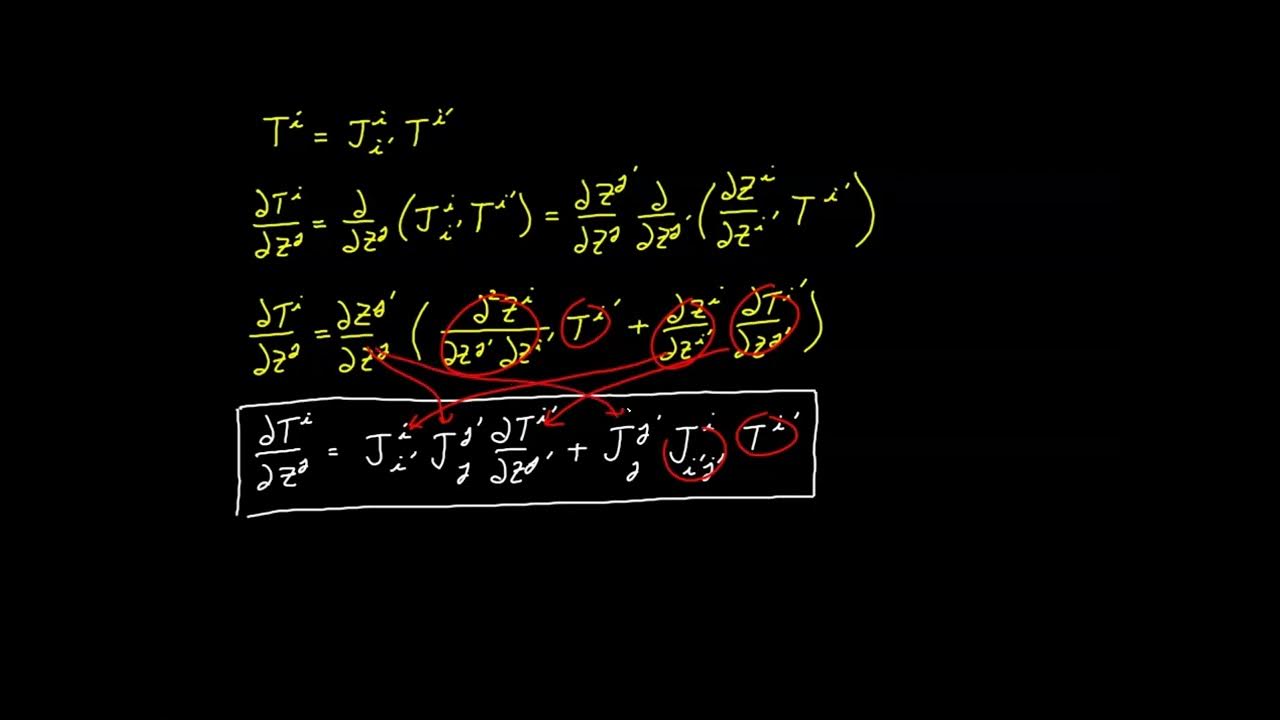Why Tensor Calculus?
TLDRThe script introduces the concept of tensor calculus, a subject unfamiliar to most before this lecture. It promises to reveal why understanding tensor calculus is essential, hinting at its unique and possibly transformative role in the field of mathematics or physics. The speaker's tone suggests that tensor calculus is a vital tool that could change the way students approach complex problems, invoking curiosity and a desire to learn more.
Takeaways
- 📚 Tensor calculus is a specialized subject that may not be familiar to many until they encounter it in a specific educational context.
- 🤔 The speaker suggests that tensor calculus is a topic that might be new to the audience, indicating its niche or advanced nature.
- 🧠 The mention of 'tensor calculus' implies that the lecture will cover mathematical concepts related to tensors, which are multi-dimensional arrays of numerical values.
- 🔍 The script hints at the importance of learning tensor calculus, suggesting it has significant relevance to the field of study being discussed.
- 👋 The speaker is introducing themselves as someone who can provide insight into tensor calculus, possibly indicating their expertise or experience in the subject.
- 📈 The script suggests a learning curve, as the audience is expected to have had no prior knowledge of tensor calculus before the lecture.
- 🎓 The transcript is likely from an educational setting, such as a university course or lecture, given the context of learning and the subject matter.
- 📝 The speaker has prepared slides, indicating a structured approach to teaching tensor calculus, with visual aids to support the lecture.
- 📖 The use of slides implies that the lecture will be informative and possibly detailed, covering various aspects of tensor calculus in a systematic way.
- 🚀 The introduction creates a sense of novelty and discovery, which might be intended to spark interest and curiosity among the audience about tensor calculus.
Q & A
What is the subject of the lecture?
-The subject of the lecture is tensor calculus.
Why is tensor calculus important according to the speaker?
-The speaker implies that tensor calculus is important, but does not provide specific reasons within the given transcript.
What does the speaker suggest about the audience's prior knowledge of tensor calculus?
-The speaker suggests that the audience has not heard of tensor calculus before attending this lecture.
What is the implication of the phrase 'you never heard of before coming here'?
-This phrase implies that tensor calculus is a specialized topic that is not commonly known or discussed outside of specific academic or professional contexts.
What can be inferred about the speaker's role in the audience's introduction to tensor calculus?
-The speaker seems to be the person responsible for introducing the audience to tensor calculus, suggesting they may be an expert or educator in the field.
What might be the purpose of the slides prepared by the speaker?
-The slides are likely intended to provide an overview and explanation of tensor calculus, including its importance and applications.
What can the audience expect to learn from the lecture?
-The audience can expect to gain an understanding of what tensor calculus is and why it is significant, presumably through the use of the prepared slides.
How does the speaker's tone suggest their view on tensor calculus?
-The speaker's tone is somewhat casual and light-hearted, suggesting they view tensor calculus as an interesting and perhaps lesser-known field of study.
What might be the reason for the speaker to emphasize 'if you hadn't met me'?
-This emphasizes the speaker's role in bringing tensor calculus to the audience's attention, possibly to highlight its niche or specialized nature.
What could be the next step for the audience after this introduction?
-The next step for the audience would likely be to listen to the lecture and engage with the material presented in the slides to learn more about tensor calculus.
Outlines
📚 Introduction to Tensor Calculus
This paragraph introduces the topic of tensor calculus, a subject that may be unfamiliar to many. The speaker humorously acknowledges that the audience probably has not heard of tensor calculus before this presentation. It sets the stage for a discussion on the importance and relevance of tensor calculus, suggesting that it is a crucial field of study that the audience will likely encounter for the first time in this context.
Mindmap
Keywords
💡Tensor Calculus
💡Slides
💡Key Words or Key Concepts
💡Core Vocabulary
💡Theme
💡Content
💡Explanation
💡Definition
💡Relation
💡Examples
💡Contexts
Highlights
Introduction to tensor calculus as an essential mathematical tool.
Explanation of tensors as multi-dimensional arrays extending the concept of vectors and scalars.
Importance of tensor calculus in fields such as physics, engineering, and computer science.
Overview of the historical development of tensor calculus and its pioneers.
Fundamental operations with tensors: addition, subtraction, and tensor products.
Introduction to covariant and contravariant tensors and their applications.
Explanation of the rank of a tensor and its implications for tensor operations.
Differentiation and integration of tensors in various coordinate systems.
Tensor fields and their role in describing physical phenomena in continuous media.
Einstein summation convention and its use in simplifying tensor expressions.
The concept of tensor density and its physical interpretations.
Applications of tensor calculus in general relativity and curvature of spacetime.
Tensor decomposition techniques and their utility in data analysis.
Introduction to Riemannian geometry and its relation to tensor calculus.
Discussion on the physical interpretation of tensors in electromagnetism.
Tensor notation and its standard conventions in scientific literature.
Practical examples of tensor calculus in machine learning algorithms.
Conclusion emphasizing the importance of tensor calculus in modern scientific research.
Transcripts
Browse More Related Video

Tensor Calculus 0: Introduction

Tensor Calculus 4c: A Few Tensor Notation Exercises

Tensor Calculus 6a: The Christoffel Symbol

Video 27 - Transformation of Partial Derivatives

Tensor Calculus For Physics Ep 8| The Metric pt. 3 |Covariant and Contravariant Vectors

Tensor Calculus Lecture 7c: The Levi-Civita Tensors
5.0 / 5 (0 votes)
Thanks for rating: